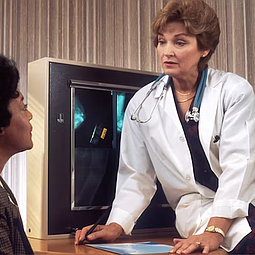6 Simple Acts Now to Reduce the Risk of Alzheimer's and Other Diseases Later
January 1, 2024 at 4:26 p.m.
It's not all about healthy eating and exercise! Increased socialization is one of the lifestyle changes to add to your New Year's resolutions -- having fun with others can decrease your risk of cognitive decline.
As she writes, current treatments may slow the development of symptoms of Alzheimer's, but there is no cure at this time. However, according to research, "lifestyle changes make a big difference in cognitive health and in the risk of developing disease." Plus, she adds, these same changes can also help you maintain a healthy heart and reduce deaths from other diseases, including certain cancers.
Manage Your Blood Pressure
In a study at Wake Forest Medical Center, those with a lower top (systolic) blood pressure reading of 120 were 19% less likely to develop mild cognitive impairment than those with a systolic reading of 140. The study also looked at brain scans for the participating individuals; the brains of those with lower blood pressure readings showed less signs of damage. The findings suggest that controlling blood pressure may reduce your risk for developing mild cognitive impairment and Alzheimer's.
Pay Attention to and Treat Hearing Loss
For three years, a study (Slowing Cognitive Decline) out of Johns Hopkins University looked at older adults with hearing loss and those who used hearing aids. The seniors using hearing aids had half the cognitive decline as those who did not use aids.
“Hearing loss is very treatable in later life, which makes it an important public health target to reduce risk of cognitive decline and dementia,” Dr. Frank Lin, the lead researcher, told the National Institutes of Health.
Get Vaccinated
It looks like getting your annual flu vaccine was associated with a 40% reduction in risk of developing Alzheimer's disease within four years. Even a single flu shot can reduce your risk by 17%, according to recent studies. Pneumonia vaccines also greatly reduced the risk of Alzheimer's for people 65-75 years old.
Gut Health
Fiber-deficient diets contribute to constipation (along with inadequate exercise and certain medications). According to the Alzheimer's Association, those who have bowel movements only every three days or less have a 73% greater risk of cognitive decline PLUS long-term health problems related to inflammation, hormone imbalance, anxiety or depression. The bottom line: (pun not intended!) pay attention to your gut and digestive health!
Avoid Ultra-Processed Foods
A study out of the U.K. and similar findings by researchers in Brazil show a 28% faster decline in global cognitive scores (memory, verbal fluency, executive function) for those who eat ultra processed foods compared with those with much lower consumption of ultra processed foods. More than 20% of a day's calories of ultra-processed food is considered high consumption. According to the author, well over half of the food commonly consumed in the United Staes is ultra processed.
"Ultra processed foods are those that go through significant industrial processes and contain large quantities of fats, sugar, salt, artificial flavors and colors, stabilizers and/or preservatives," per the Alzheimer's Association. Some of the most common culprits are soda pop, breakfast cereals, white bread, chips, and many common foods, including ice cream, lasagna, pizza, hamburgers and fries.
Make Time to Socialize
"Alzheimer's researchers are now looking into whether increased socialization, along with a [grouping] of lifestyle interventions including improved diet, exercise, cognitive stimulation and monitoring for heart-health risk can protect cognitive function," stated a press release by the Alzheimer's Association. They recommend finding social outlets that work for you such as enrolling in a classes with a friend to finding other ways to have fun while being sociable.
To read the full article with links to the research studies cited by the author, please visit this link: 6 Simple Acts to Reduce the Risk of Alzheimer's





